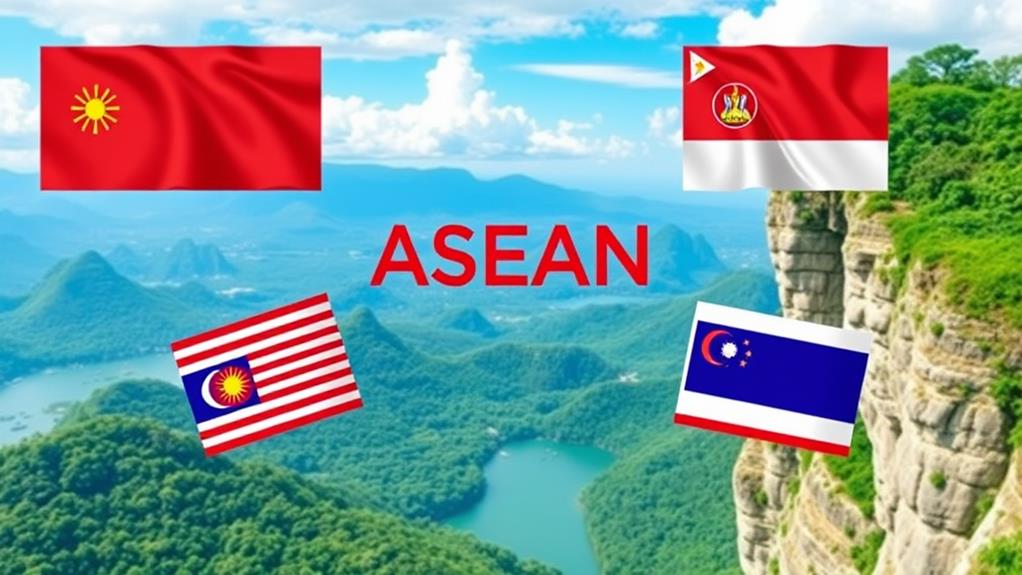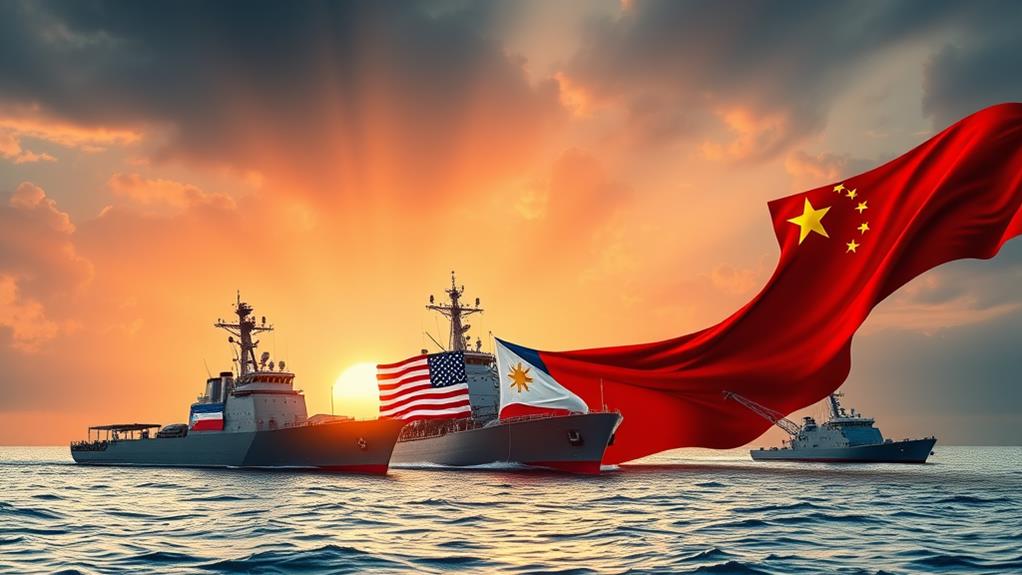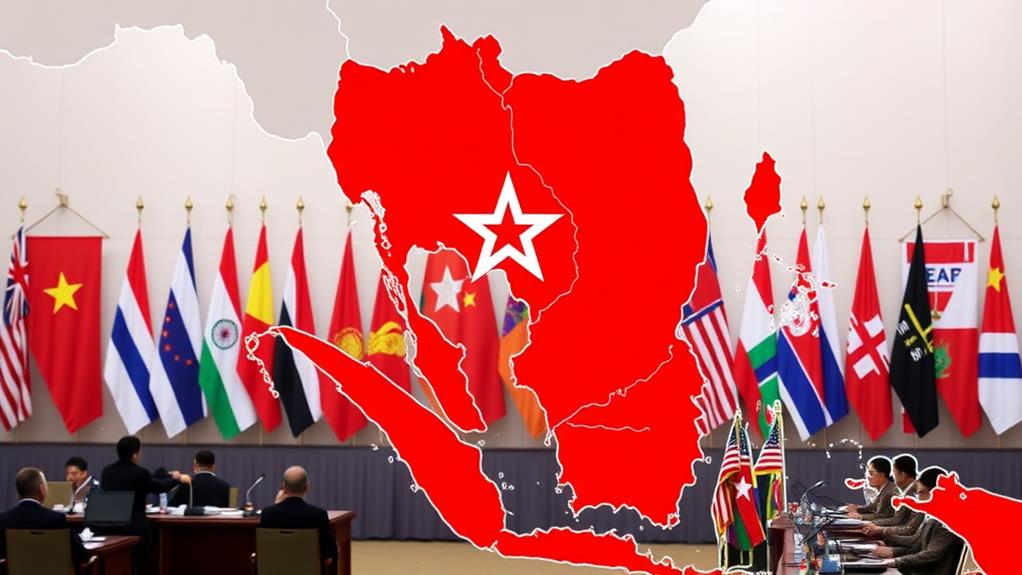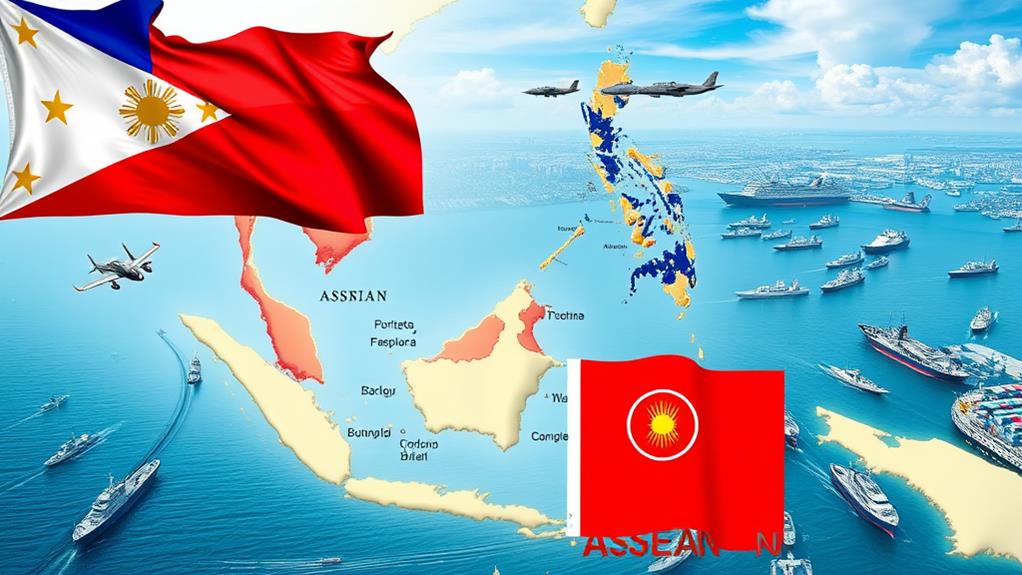The Philippines plays a vital role in ASEAN's regional security and cooperation as a founding member. The association's primary objectives, established in 1967, are to promote economic growth, social progress, and regional peace and stability.
The South China Sea disputes with China pose a significant challenge to the Philippines and ASEAN's security landscape. This is further complicated by the U.S.-China rivalry. To address these security threats, the Philippines engages in ASEAN's Political-Security Community to enhance regional stability.
The country also collaborates bilaterally with other nations, such as Vietnam and the U.S., to counter security threats. For example, the Philippines and Vietnam have conducted joint naval exercises to strengthen their maritime security cooperation.
Similarly, the Philippines has strengthened its defense ties with the U.S. through the Enhanced Defense Cooperation Agreement.
Adaptive strategies are essential to address pressing regional issues. Exploring these strategies in more detail will provide deeper insights into ASEAN's evolving role in regional security and cooperation.
ASEAN's Founding and Goals

ASEAN's Founding and Goals
ASEAN's Founding
On August 8, 1967, five Southeast Asian countries – Indonesia, Malaysia, the Philippines, Singapore, and Thailand – signed the ASEAN Declaration in Bangkok, marking a significant turning point in the region's history.
This event was driven by the need for regional cooperation to accelerate economic growth, social progress, and cultural development, as well as to promote regional peace and stability.
Historical Context
The importance of collaboration in fostering economic activities among neighboring countries is underscored by the historical context of regional trade routes.
For instance, the Malacca Strait, a critical trade route, highlights the significance of cooperation in promoting economic growth.
Primary Objectives
The primary objectives of ASEAN, as stated in the ASEAN Declaration, are to:
- Boost economic growth through joint endeavors
- Foster social progress and advance cultural development
- Promote regional peace and stability by adhering to the principles of justice and the rule of law, in line with the United Nations Charter
Expansion and Initiatives
Since its inception, ASEAN has expanded to include Brunei, Vietnam, Laos, Myanmar, and Cambodia.
The organization has established several key agreements and structures, such as the Treaty of Amity and Cooperation and the ASEAN Security Community, to foster cooperation and ensure regional stability.
These initiatives reflect ASEAN's commitment to creating a cohesive and prosperous community in Southeast Asia.
South China Sea Disputes
The South China Sea is a critical maritime pathway that has become a focal point of regional tensions. This region is disputed by multiple claimants, including the Philippines, Vietnam, Malaysia, Brunei, and China, each seeking control over islands, reefs, and resources.
Historically, maritime routes in the region have served as crucial trade channels, similar to how the Pasig River served as a trade hub during the Spanish colonial period, highlighting the economic stakes involved in these disputes.
These disputes have highlighted the challenges ASEAN faces in managing regional conflicts. Despite the Declaration on the Conduct of Parties in the South China Sea (DOC) signed in 2002, which aimed to promote consultation and maintain peace, China has continued to assert its claims aggressively, leading to militarization and land reclamation activities.
The Philippines, a key ASEAN member, has been particularly affected, with frequent confrontations over areas like the Second Thomas Shoal in the Spratly Islands.
ASEAN's inability to forge a unified stance on these issues stems from varied economic and diplomatic dependencies among its member states and a lack of trust within the organization and with China. This fragmentation hampers effective cooperation, allowing China to exploit the situation and undermine regional stability.
The ongoing negotiations for a more binding Code of Conduct underscore the urgency and complexity of resolving these disputes.
Impact of U.S.-China Rivalry

The U.S.-China rivalry is escalating tensions in the South China Sea, complicating the regional landscape for ASEAN member states. Both superpowers are vying for influence in Southeast Asia, with China asserting expansive sovereignty claims and the U.S. upholding international law and norms. This rivalry is particularly significant in the South China Sea, where maritime routes are crucial for trade and security.
ASEAN's ability to address security challenges is hindered by its consensus-based decision-making. This often leads to paralysis in the face of critical issues, such as Chinese aggression or the crisis in Myanmar.
As a result, individual ASEAN member states are exploring alternative security arrangements. For example, the Philippines is engaging in minilateral cooperation with countries like Japan and the U.S. to bolster regional security.
These minilateral engagements aim to enhance maritime domain awareness and defense capabilities. This is crucial given China's increasing militarization in the South China Sea.
The Philippines' recent moves to strengthen ties with other security partners reflect a broader trend of seeking external support to counter Chinese expansionism. This includes participation in joint naval exercises and strategic partnerships.
This strategy highlights the limitations of ASEAN's current framework in addressing pressing security concerns.
Philipine Multilateral Security Strategies
Philippine Multilateral Security Strategies
The Philippines employs multifaceted multilateral security strategies to ensure regional stability and protect its interests in Southeast Asia. As an ASEAN member, the country benefits from the regional bloc's emphasis on dialogue and cooperation in addressing security challenges.
ASEAN Regional Cooperation
The Philippines engages in ASEAN's security initiatives, such as the ASEAN Political-Security Community (APSC), which promotes regional peace and stability through cooperation and dialogue among member states.
This cooperation enables the Philippines to address security challenges with its regional neighbors.
Bilateral and Strategic Partnerships
The Philippines strengthens bilateral ties with fellow ASEAN members and other regional players. For example, the country has elevated its relations with Vietnam to a strategic partnership, covering areas such as defense and security cooperation.
This partnership enhances the Philippines' security capabilities and fosters regional stability.
Capacity Building and Technical Support
The Philippines leverages ASEAN's connections with global partners to gain access to capacity-building programs and technical assistance.
This support enhances the country's security capabilities, addressing transnational challenges and promoting regional security.
ASEAN's Response to Myanmar Crisis

ASEAN's Response to Myanmar Crisis: Ineffective and Divided
ASEAN's response to the Myanmar crisis has been ineffective in addressing the escalating violence and geopolitical tensions. The Five-Point Consensus, agreed upon in 2021, called for an immediate cessation of violence, dialogue among all parties, and the mediation of an ASEAN special envoy.
However, the Myanmar military has largely ignored these calls, leading to continued violence and human rights abuses.
The lack of decisive action from ASEAN is partly due to its principles of non-intervention and consensus-building, which hinder the imposition of consequences on the military government.
ASEAN members are divided on how to address the crisis, with some engaging bilaterally with the junta, undermining regional cohesion. This lack of a cohesive approach has compromised ASEAN's effectiveness, allowing geopolitical risks to escalate with major actors like China, India, and the U.S. potentially sidelining ASEAN.
To remain relevant, ASEAN must reconsider its strategy, likely involving broader engagement with non-junta actors like the National Unity Government and ethnic armed groups. This shift could help ASEAN regain its role as a significant regional actor and address the dire humanitarian and security situations in Myanmar.
By engaging with a broader range of stakeholders, ASEAN can work towards a more effective and unified response to the crisis.
How Does the Philippines’ Strategic Partnership with Japan Impact Regional Security and Cooperation within ASEAN?
The philippines and japan partnership has significantly impacted regional security and cooperation within ASEAN. With their mutual commitment to upholding peace and stability in the region, the two countries have bolstered their military ties, engaged in joint maritime exercises, and collaborated on various security initiatives, strengthening the overall defense capabilities of ASEAN.
Regional Security Alternatives
As the Myanmar crisis undermines ASEAN's credibility and effectiveness, alternative regional security strategies are necessary to address escalating violence and geopolitical instability.
ASEAN's Limitations: The organization's consensus principle has led to paralysis, prompting member states to explore other avenues for securing the region.
Historically, regions like the Philippines have demonstrated resilience in managing economic challenges, highlighting the importance of collaboration for stability.
Regional Security Alternatives: To navigate the complex security landscape, ASEAN member states can consider the following strategies:
1. Minilateralism: This approach involves smaller, more flexible groupings of like-minded nations tackling specific security challenges.
The Philippines has successfully adopted minilateralism, cooperating with Australia, Japan, and the United States to counter Chinese expansion in the South China Sea.
2. Bilateral and Trilateral Agreements: Strengthening bilateral ties and forming trilateral partnerships can provide more effective and expedient responses to regional security threats.
The Philippines' enhanced security cooperation with Japan, focusing on maritime security and defense capabilities, is a prime example.
3. External Security Frameworks: Engaging with external security frameworks such as the Quadrilateral Security Dialogue (Quad) and the AUKUS pact can offer additional layers of security and cooperation.
These frameworks allow for more robust responses to shared threats, bypassing the constraints of ASEAN's consensus-based decision-making.
Future of Southeast Asian Cooperation

ASEAN's Future Depends on Adaptation and Evolution
The future of Southeast Asian cooperation relies on ASEAN's ability to adapt and evolve beyond its current limitations. The region faces increasing great power competition, particularly between China and the U.S., which ASEAN must navigate carefully.
China's Economic Might and Diplomatic Efforts
China's economic presence in Southeast Asia is significant, and its diplomatic efforts have given it a strong foothold in the region. For example, China is the largest trading partner of many ASEAN countries, and its Belt and Road Initiative (BRI) has invested heavily in regional infrastructure projects.
The Importance of Environmental Cooperation
Southeast Asia's rich biodiversity, such as the thriving ecosystems of Sierra Madre, highlights the importance of environmental cooperation in fostering sustainable development. ASEAN must work together to protect its natural resources and address climate change, which affects the region's food security, water scarcity, and natural disaster resilience.
Japan and India's Roles in Southeast Asia
Japan is a key economic partner and a source of development assistance, with deepening cultural and societal ties with Southeast Asia. For instance, Japan has provided significant funding for infrastructure development in Cambodia, Laos, and Myanmar.
India, despite its historical and cultural connections, lags behind in economic involvement but maintains significant naval power.
ASEAN's Path to Success
To succeed, ASEAN needs to fortify its autonomy and centrality by leveraging its multilateral and bilateral relations. This includes enhancing its security apparatus and fostering closer ties with strategic partners like the U.S., while avoiding rigid alliances that could undermine its regional leadership.
Questions and Answers
How Does Asean's Consensus Principle Affect Decision-Making?
ASEAN's consensus principle significantly influences decision-making by requiring unanimous agreement among member states. This approach ensures that no single country can impose its will on others, maintaining regional harmony and respecting national sovereignty.
For instance, during the 2019 ASEAN Summit, a consensus was reached on the ASEAN Outlook on the Indo-Pacific, showcasing the region's commitment to cooperation and unity.
However, this principle can lead to slow and sometimes ineffective decision-making, especially on contentious issues. Any member state can veto a proposal, making it challenging to address urgent regional challenges.
For example, ASEAN's inability to reach a consensus on the South China Sea dispute has hindered collective action to resolve the issue.
What Role Do Non-Asean Nations Play in Regional Security Dialogues?
Non-ASEAN nations significantly contribute to regional security dialogues by participating in the ASEAN Regional Forum (ARF).
In this multilateral platform, countries like the United States, China, Japan, and Australia engage in discussions to foster cooperation and confidence-building.
These nations share perspectives, address common security concerns, and promote preventive diplomacy, enriching the dialogue and enhancing regional stability.
Their involvement helps in building a more predictable and constructive pattern of relations in the Asia-Pacific region.
How Has Economic Growth Influenced Asean's Security Policies?
Economic growth has significantly influenced ASEAN's security policies by prioritizing comprehensive security, which integrates economic development with peace and stability. This approach recognizes that economic growth is essential for regional security.
ASEAN's emphasis on regional economic integration and cooperation is a prime example of this strategy.
ASEAN's regional economic integration and cooperation are crucial for security. The ASEAN Outlook on the Indo-Pacific, for instance, focuses on inclusive economic cooperation and dialogue to manage security challenges.
This approach reflects the belief that economic stability is crucial for regional security, as it helps to prevent conflicts and promotes a stable environment for economic growth.
What Are the Implications of Asean's Expansion on Regional Stability?
ASEAN's expansion has complex implications for regional stability.
On one hand, ASEAN's growth enhances economic interdependence, which can reduce great power conflicts by fostering a rules-based order. Increased trade and investment among member states promote mutual dependence, making conflict less likely. This, in turn, can lead to a more stable region.
On the other hand, ASEAN faces challenges from external factors such as the US-China rivalry, which can undermine regional stability. The rivalry can lead to a division among ASEAN member states, weakening the organization's ability to promote stability.
Additionally, internal issues such as weak institutional capabilities and domestic conflicts also pose a threat to regional stability. For example, some member states struggle with corruption and ineffective governance, which can hinder ASEAN's ability to respond to regional challenges.
Effective management of these dynamics is crucial for maintaining regional stability and ASEAN's centrality. This requires ASEAN to strengthen its institutional capabilities, promote greater economic integration, and engage in constructive dialogue with external powers to mitigate the impact of the US-China rivalry.
How Effective Are Minilateral Mechanisms in Addressing Regional Threats?
Minilateral mechanisms can be an effective way to address regional threats. These mechanisms allow for targeted cooperation among select countries, which enables more agile decision-making and resource allocation compared to broader multilateral frameworks.
For example, the Association of Southeast Asian Nations (ASEAN) uses bilateral dialogues and regional security initiatives, such as the ASEAN Regional Forum, to enhance cooperation on specific issues like counter-terrorism and maritime security. This targeted cooperation helps to mitigate risks more efficiently.
However, the success of minilateral mechanisms depends on the commitment and coordination among participating states.